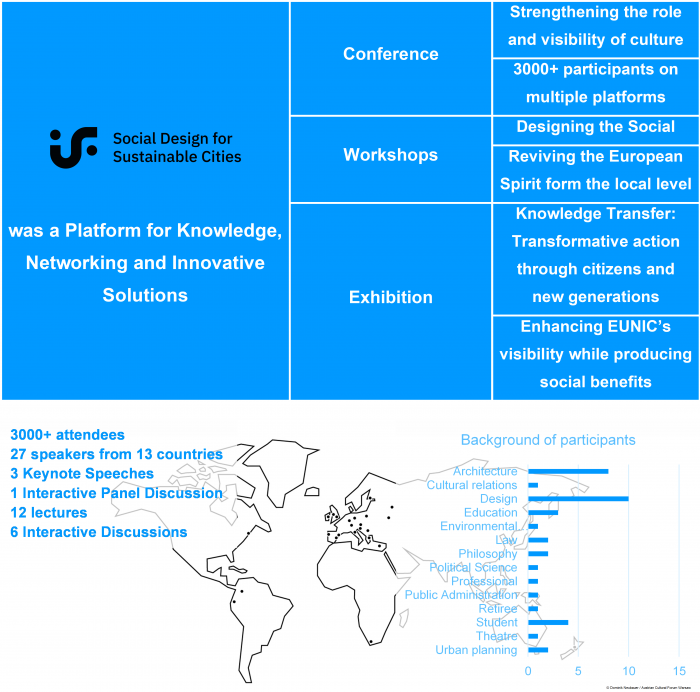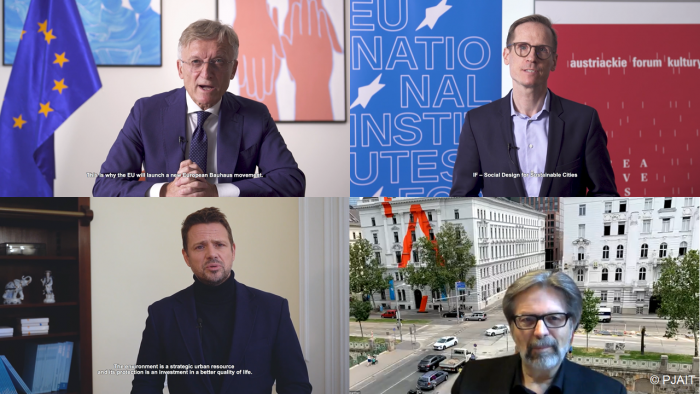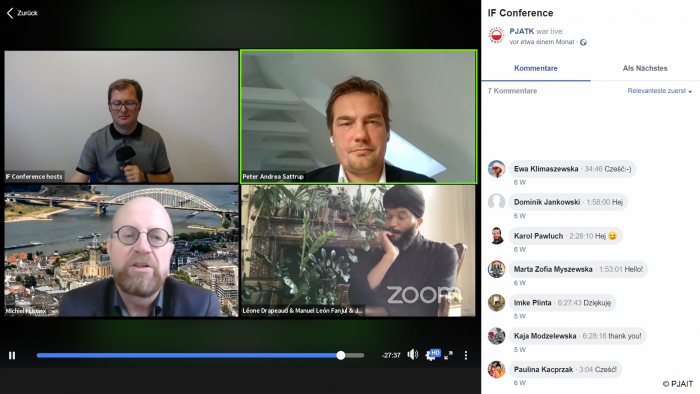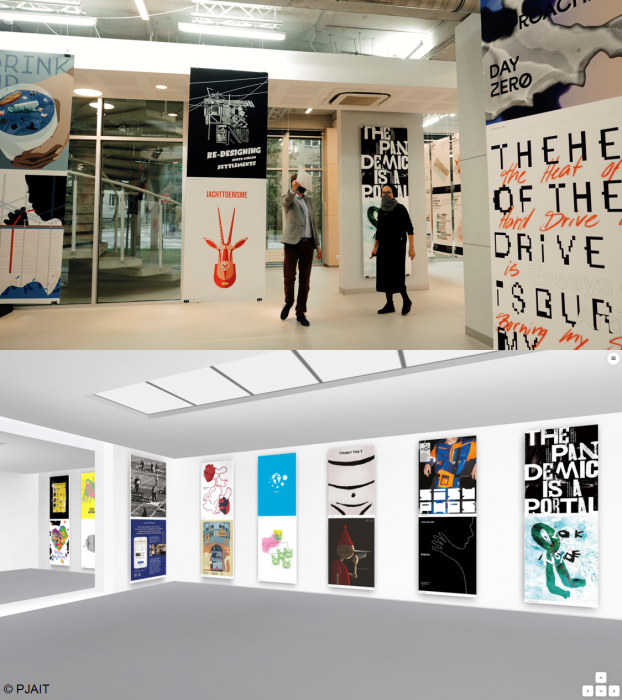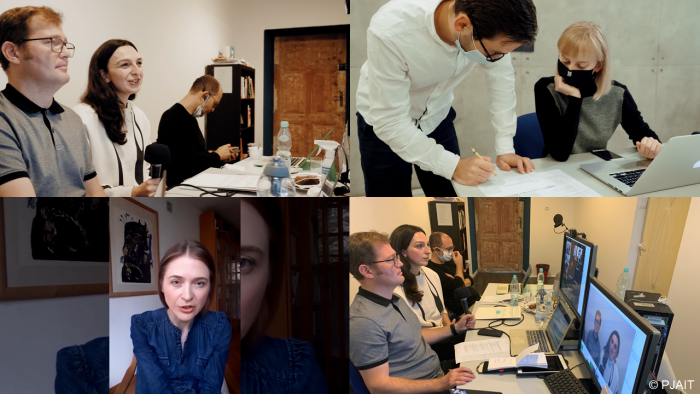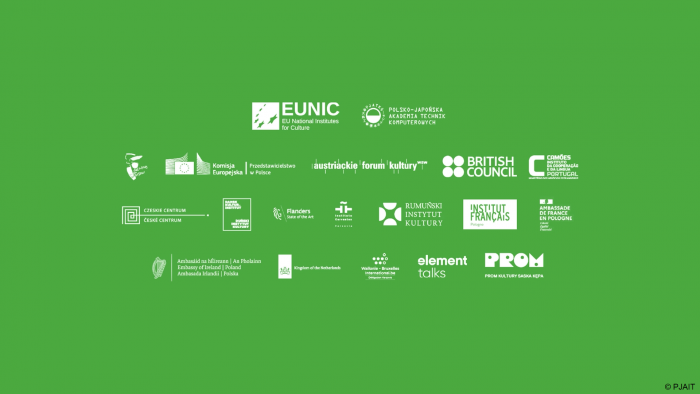I. SUMMARY INFORMATION
Project
267550
Status
Submitted
Award category
Mobilisation of culture, arts and communities
You want to submit
NEW EUROPEAN BAUHAUS AWARDS : existing completed examples
Project title
IF: Social Design for Sustainable Cities
Full project title
IF: Social Design for Sustainable Cities - Make cities inclusive, safe, resilient and sustainable
Description
IF: Social Design for Sustainable Cities aimed to highlight and strengthen the involvement of culture and social design in the societal debate on sustainable cities. The project provided a platform for creative minds using arts as a tool for sustainable urban innovation, connecting them with practitioners, decision-makers, activists, scholars and students. Activities consisted of a conference with interactive panels, workshops for international design students and an exhibition by young artists.
Where was your project implemented in the EU?
Poland
Mazovian Voivodeship
ul. Próżna 7/9
Warsaw
00-107
When was your project implemented?
Has your project benefited from EU programmes or funds?
No
Which programme(s) or fund(s)? Provide the name of the programme(s)/fund(s), the strand/action line as relevant and the year.
II. DESCRIPTION OF THE PROJECT
Please provide a summary of your project
The mission of IF – Social Design for Sustainable Cities was to highlight and strengthen the involvement of culture in the discourse on sustainable urban development; support the exchange of experience between cities, stakeholders and citizens; showcase activities undertaken at the local level; serve as interface between experts and civil society; and empower citizens by sharing knowledge and information. Thereby illustrating that arts are key for inclusive and sustainable community building.
The project connected creative examples of transformative design actions towards sustainable cities with stakeholders from Europe and beyond. The project featured a virtual conference with 27 speakers from 13 countries in interactive live panels, attended by more than 3.000 people on multiple platforms. Participants ranged from scholars and students representing 28 universities, practitioners such as designers, architects, urban planners and entrepreneurs, decision-makers such as mayors and public officials, to members of civil society and advocacy groups ensuring an enriched interdisciplinary and inclusive exchange. The conference was complemented by workshops for students and a poster exhibition by over 300 young artists from 28 countries. Two publications and a website act as a repository for disseminating replicable best practices.
A key feature was the project’s interdisciplinary co-creation by 12 members of EU National Institutes for Culture (EUNIC) Warsaw – the local cluster of Europe’s network of organisations engaging in cultural relations – together with the Polish-Japanese Academy of Information Technology and other local, European and international partners, including 28 art, design and architecture schools and research institutions from Europe and beyond, the City of Warsaw, the European Commission Representation in Poland, PROM – a local cultural centre – and Element Talks – a Polish design festival. Follow-up projects with a potential of upscaling are planned.
Please give information about the key objectives of your project in terms of sustainability and how these have been met
IF – Social Design for Sustainable Cities aimed at engaging, involving and empowering the public on a topical issue of great local, European and global importance.
Sustainable Development Goal 11 on making human settlements inclusive, safe, resilient and sustainable served as a point of reference to frame the debate. Cities and human settlements are growing at an unprecedented rate. Culture and cultural heritage bind human settlements together. The project therefore aimed at highlighting that sustainability can only be achieved if culture, understood in a broad sense, and creativity constitute a vital pillar in discourse and decision-making.
IF – Social Design for Sustainable Cities intended to facilitate an interdisciplinary people-to-people exchange on a platform where architects, artists, students, engineers, designers and representatives of (local) government, the EU, business and civil society could network, discuss freely and share ideas, lessons learned and good practices of sustainable urban development at different levels, from grassroots initiatives to high-level politics.
An overwhelming majority of participants stated to have benefited from the project. Experts and practitioners, including staff of various public authorities involved in the project, developed contacts across disciplines and gained an increased understanding of local needs and citizens’ perspectives. Citizens, incl. the students from the 28 partner universities, felt empowered by the knowledge transfer and increased visibility of their needs. Participants also felt that activities promoted dialogue, mutual understanding and European values.
Please give information about the key objectives of your project in terms of aesthetics and quality of experience beyond functionality and how these have been met
Apart from an international conference facilitating broad interdisciplinary exchange, the project IF – Social Design for Sustainable Cities aimed at connecting social design communities in Europe and beyond to harness their particular contributions for the debate on sustainable urban development. This was made possible through the large international academic network involved in the project, with 28 art, engineering and design schools participating in the open call for a poster competition, also supported by ELIA and Cumulus.
Every participating university held an internal competition, participating students represented all study levels and a broad field of disciplines. The selected works were often connected to case studies or projects and dealt with problems and solutions of sustainable urban development in a local context, e.g. urban regeneration, public space appropriation, microarchitectures, targeted interventions, temporary spaces, redesign and redevelopment, resettlement, urbanisation processes, spatial communication and dysfunctional zones. The case studies formed the basis of workshops complementing the conference.
The exhibition containing posters and multimedia projects by over 300 art and design students was presented two days ahead of the conference at PROM kultury, one of Warsaw’s landmark local culture centres. The opening was broadcasted live and additionally, due to the pandemic, a 360-degree virtual tour of the exhibition was presented online. Thus, the experience and visibility of design students and the impact of their bottom-up contributions on the international expert conference proceedings could be increased considerably.
By closely incorporating local academic partners as well as European and international art, design and architecture schools and research institutes the project had a lasting aesthetic outreach.
Please give information about the key objectives of your project in terms of inclusion and how these have been met
The project IF – Social Design for Sustainable Cities intended to establish a platform for dialogue spanning over disciplines and generations to create, innovate and propagate inclusive bottom-up solutions to sustainable urban development. It connected science and technology with arts and culture, thus reinforcing the cultural dimension of sustainable development.
Participants had the opportunity to mutually contribute and learn how inclusive, accessible strategies and solutions for sustainable urban development can be combined with new economic approaches and social innovation to generate local value. At every stage experts, citizens and students actively co-designed and shared responsibility. Workshops were led by international lecturers, some of which also spoke at the conference, and attended by students whose works were shown in the poster exhibition. Workshops thus crucially facilitated knowledge transfer and exchange. Main themes were diversity, the environmental crisis as a design crisis, ownership of public spaces, encouraging behavioural change through design and accessibility.
This process of community empowerment was shored up by interactive panels at the international conference, where creative thinkers and practitioners with diverse backgrounds shared their visions and directly engaged with citizens, growing momentum and bridging elites-citizens gaps. Speakers raised topics such as citizen engagement in sustainable urban development, repurposing spaces for new public uses, and educating young people on zoning and development. The Mayor of Warsaw highlighted the environment as a strategic resource, the Head of the European Commission Representation in Poland explained how the New European Bauhaus introduces a transversal cultural perspective to the EU’s climate strategy, and the Rector of the University of Applied Arts Vienna presented arts as radical answer to radical challenges.
Please give information on the results/impacts achieved by your project in relation to the category you apply for
The project IF – Social Design for Sustainable Cities advanced cross-sectoral links between arts and sustainability, and encouraged experts, practitioners and citizens to get out of their institutional frames and engage in an interdisciplinary debate.
It highlighted the specific role of artists and social designers in sustainable community building, as they are particularly capable of working in situations where the destination is unknown and where experimentation is required. IF – Social Design for Sustainable Cities made it clear that an equitable transition towards sustainable urban development needs a real shift in behaviours and thinking. Arts and culture have a special function to play as an accelerator of this shift – through their ability to reach people on the level of emotions, provide new ways of seeing problems and develop creative solutions.
With its threefold approach of an international online conference, student workshops and an online poster exhibition the project had a considerable impact in raising awareness about the essential contribution of artists in the transition to sustainable cities. Thus, a majority of attendees stated that the project has raised awareness and changed their ways of thinking and attitudes about the role of arts and culture in sustainable development. Experts, practitioners and decision makers commented that they have gained new ideas, actions and venues of collaboration, insights in local needs and citizens’ perspectives, and changed their attitudes about local issues. Citizens, not least students, were given a voice and were empowered by a truly inclusive exchange of knowledge.
Please explain the way citizens benefiting from or affected by the project and civil society have been involved in the project and what has been the impact of this involvement on the project
Given the local, European and global relevance of the subject matter IF – Social Design for Sustainable Cities included European as well as international speakers and workshop leaders, as well as Polish experts, researchers and activists, creating a context of local ownership and credibility.
The project boosted citizens’ access to culture and knowledge and their understanding of the reciprocal and transformative relationship between social design and sustainability. Furthermore, the project showed how the arts and culture can be used as a positive and powerful tool in sustainable urban development and the place and impact of transformative social design in their own lives and community.
There was a concrete focus on breaking down barriers between groups and bringing together insights and skills from different sides and points of view, creating wide ownership and responsibility.
Communities and individuals, which generally do not have the opportunity to do so, were provided a platform to share their perspectives and needs as well as gain practical and basic knowledge regarding sustainable urban development in a way to foster their participation in decision-making and social change. The importance of cultural diversity and cultural identity were shown as a social strength and richness. Culture and arts were thus used as a bridge between people.
Citizens, in particular students and other young people, were enriched with skills and knowledge to push them to become positive and resilient agents of change within their own local communities. Civil society leaders were given means and skills to promote their work and expand their network at a local and international level.
Please highlight the innovative character of the project
IF – Social Design for Sustainable Cities presented culture in an innovative, topical context – sustainable urban development – aimed at serving society beyond the arts. From a bottom-up-approach participants had the opportunity to learn i.a. about principles of inclusive design, digital ecology, ephemeral architecture and social purpose, harnessing the power of stakeholders, creating value by intelligent design and the co-creation of balanced ecosystems.
The multi-faceted project, consisting of a conference, workshops and an exhibition, profited highly from the active involvement and shared responsibility of diverse local stakeholders and communities from academia, administration and cultural stakeholders. This led to a strong co-creative partnership, enabling all partners to add value and identify possible follow-up projects. Thus, EUNIC Warsaw has agreed on a Shared Strategic Vision with the European Commission Representation in Poland, establishing a nexus for future in-depth cooperation.
Due to the COVID-19 pandemic, the project had to be moved to the virtual sphere and an original hybrid format was created. This decreased the environmental impact, democratised access to knowledge, facilitated a broader knowledge transfer and resulted in a considerably wider outreach and impact. The main project element, a virtual conference with interactive speeches and panels was livestreamed on ZOOM, Facebook and YouTube and attended by more than 3.000 people. Sessions were mostly live to allow direct interaction with the audience. Attendees could interact with the speakers and each other, enabling them to question, comment and share. Evaluation and feedback showed that the format successfully provided networking opportunities.
Due to an electronic companion, an extensive publication and the project’s website containing essays, case studies, subtitled recordings, results of workshops and a 360° virtual tour of the exhibition, citizens continue to benefit from the project.
Please explain how the project led to results or learnings which could be transferred to other interested parties
IF – Social Design for Sustainable Cities enabled participants to share their views and use their expertise and at the same time get out of their professional and societal box. The project provided new ideas and collaboration opportunities, it connected participants to a global community of imaginative individuals dedicated to sustainable local change, enabling attendees to see sustainability in a larger context.
Best practice examples from a wide range of cities presented by experts and practitioners paired with local needs shared by citizens have high potential of transferability to different contexts. Findings have been clearly documented (cf. Final Report below) and are publicly accessible.
It was vital for the project’s success to use strengths and pool resources of EUNIC Warsaw members, relevant local and international NGOs and CSOs as well as governmental and public institutions. These actors were actively involved as equal partners at all times when drawing context, identifying local needs, designing project ideas and implementing and evaluating the project, applying a multi-way connection paired with constant monitoring of progress and roles. The high level of mutual trust among partners not only ensured the realisation of this multi-faceted project, but also established a framework for continued interdisciplinary discussions on sustainable urban growth including creative minds.
IF – Social Design for Sustainable Cities has shown that an integrated approach to sustainable urban development needs to include creativity, heritage, knowledge and diversity. Social design and the arts are catalysts and drivers for developing people-centred societies and key in achieving sustainable cities. Cities need creativity, vitality and innovation, identity and inclusion – culture is a pre-condition for these needs. Thus, citizens in general but artists and designers in particular need to expand their role and become actively involved and at times act as protagonists.
Is an evaluation report or any relevant independent evaluation source available?
III. UPLOAD PICTURES
IV. VALIDATION
By ticking this box, you declare that all the information provided in this form is factually correct, that the proposed project has not been proposed for the Awards more than once under the same category and that it has not been subject to any type of investigation, which could lead to a financial correction because of irregularities or fraud.
Yes
